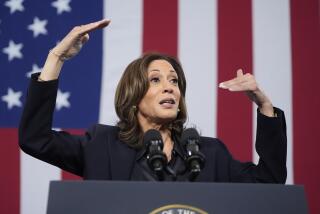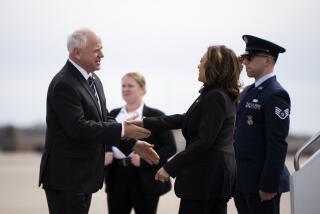Dukakis Avoids Attacking Jackson, Takes Aim at Bush
- Share via
YOUNGSTOWN, Ohio — Massachusetts Gov. Michael S. Dukakis, seeking to put aside any focus on his Democratic presidential rivalry with the Rev. Jesse Jackson, targeted Vice President George Bush in campaign stops Friday in blue-collar Ohio.
Dukakis, whose campaign of expanded high-tech horizons is associated more with white lab coats than workers’ wind breakers, delved into nitty-gritty industrial regions searching for votes among Ohio’s union members.
From an electrical workers’ union hall in Columbus to a high school in this one-time steel workers’ town near the Pennsylvania border, Dukakis’ vehicle of attack was President Reagan’s anticipated veto of a massive trade bill approved by the Senate in a 63-36 vote on Wednesday.
The White House has singled out a provision in the bill requiring some manufacturers to provide workers and government officials with a 60-day notice before closing factories and other facilities or undertaking layoffs, asserting that such a measure limits the flexibility of the companies.
Electrical Workers
Dukakis, speaking to approximately 200 members of the International Brotherhood of Electrical Workers early Friday in Columbus, said: “We need a strong plant-closing law that will give our workers the notice, the training, and the benefits they need to find new jobs with good wages when plants shut down in this country.”
In focusing on the trade legislation, Dukakis was acknowledging the advice that he must win back the blue-collar Democrats who abandoned the party in 1984. Four years ago, a majority of blue-collar voters in Ohio, long a swing state in presidential elections, voted for Reagan.
The Massachusetts governor is the acknowledged front-runner in the race for the Democratic presidential nomination, following his victories last Tuesday in the Pennsylvania primary and in New York one week earlier. He has won 1,264--and Jackson 852--of the 2,081 delegates needed to win the party’s nomination, according to an Associated Press count.
His immediate targets are the primaries Tuesday in Ohio and Indiana, where he must guard against overconfidence on the part of his campaign workers that could allow Jackson to edge up on him much as Gary Hart upset Walter F. Mondale four years ago in the two states, even though Mondale went on to win the 1984 Democratic nomination. Current polls give Dukakis a 2-1 edge in the two states.
On the sun-drenched Courthouse Square in downtown Dayton, he found a cheering, receptive audience at lunchtime.
“This guy will swing the voters as good as Reagan did the other time,” said retired General Motors electrician Ed Penix. “They’re going to come out of the woodwork to vote for him.”
Dukakis had planned to shake hands with auto workers in nearby Lordstown, site of a bitter wildcat strike against General Motors about a decade ago, but rain forced him to cancel the labor-oriented appearance.
Economic Themes
Instead, he addressed a rally at a high school, stressing economic themes, and told a news conference: “It is the economic issue, the issue of jobs and our economic future, that is the single most important priority we have.”
That theme, said Gov. Richard F. Celeste on the first of four days Dukakis is spending in Ohio and neighboring Indiana, is “exactly what people are focusing on.” Celeste spoke with reporters after introducing the candidate to the electrical workers in Columbus.
Dukakis’ swing through Ohio came one year to the day after he declared his candidacy for the presidency, opening a campaign built around his experience as governor of Massachusetts and that state’s economic resurgence, stemming to a large degree from the growth of computer and other advanced technology industries.
Now, with the Democratic Party’s nomination becoming more assured and his focus shifting toward the general election campaign, it is time for Dukakis to move to cement a relationship with the union-member Democrats who have traditionally boosted his party in the industrial Midwest but who helped to give Reagan overwhelming margins in 1980 and 1984.
“The battleground, ultimately,” will be among “blue-collar Reagan types who are old Democrats and aren’t so sure about Bush,” said a Democrat who served on the White House staffs of both Lyndon B. Johnson and Jimmy Carter.
Erle Temple, listening to Dukakis at the Columbus union hall, was just the audience the governor was seeking--a Reagan voter who said of Bush: “I don’t get too excited about him.”
What about Dukakis?
“I kind of like him. I think he’s a go-getter,” Temple said.
More to Read
Get the L.A. Times Politics newsletter
Deeply reported insights into legislation, politics and policy from Sacramento, Washington and beyond. In your inbox three times per week.
You may occasionally receive promotional content from the Los Angeles Times.










